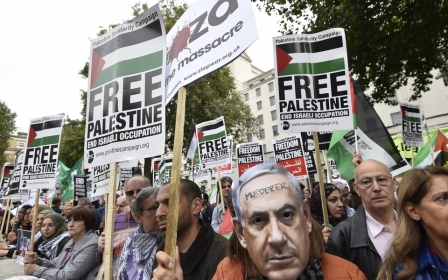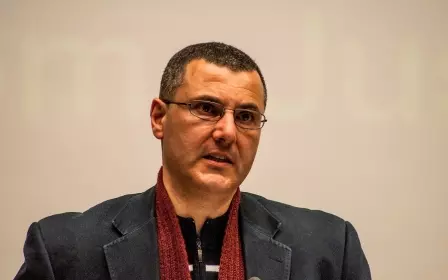'We have shifted from defence to offence': Israel bans 20 boycott groups
Israel has issued a list of organisations that are officially banned from entering the country because they support the pro-Palestinian Boycott, Divestment and Sanctions (BDS) movement.
The Ministry of Strategic Affairs released the list of 20 organisations, which included groups from the United States, Europe, Latin America and South Africa, after refusing to divulge for months which ones were banned.
The ministry, however, did not clarify whether the list included Israeli citizens who supported the boycott but did say that activists who wish to move to Israel based on the country's Law of Return will be able to do so.
'Rather than change its disastrous occupation policies, Israel is preoccupying itself with campaigns of harassment against anyone who dares criticise its inhuman treatment of Palestinians'
- Ismail Patel, Friends of Al-Aqsa
The organisations listed include the UK-based Friends of al-Aqsa group, the Palestine Solidarity Campaign, the Jewish Voice for Peace group and War on Want.
One group included in the list is an American Quaker organisation that won the Nobel Peace Prize in 1947 for helping victims of the Nazis.
Norway's foreign minister, who was on her first official visit to Israel, reportedly complained to Prime Minister Benjamin Netanyahu on Sunday and filed an official protest over a Norwegian aid worker who was refused entry back into Israel from a trip abroad as a result of the blacklist.
"It is very unfortunate that Norwegians who want to follow up various programmes and aid projects have been or may risk being denied entry to Israel," Foreign Minister Ine Eriksen Soreide was quoted as saying in the Norwegian VG newspaper.
War on Want’s executive director Asad Rehman told Middle East Eye that the blacklist was a "desperate attempt to silence a growing movement that is holding Israel to account for its systematic abuse of Palestinian rights".
"The UK government must condemn this latest crackdown on human rights defenders," said Rahman.
"It must also take immediate steps to hold Israel to account for its continuing violations of Palestinian rights through measures such as the immediate suspension of its trade relations with Israel, including the arms trade."
Strategic Affairs Minister Gilad Erdan defended the list and said that "boycott organisations need to know that the state of Israel will act against them and not allow [them] to enter its territory to harm its citizens".
Erdan added: "We have shifted from defence to offence. No country would have allowed critics to harm the country by entering it."
'How far Israeli is willing to go'
Ismail Patel, who chairs Friends of Al-Aqsa, told MEE that being put on the blacklist simply "reaffirms his group's support for the BDS movement".
"The blacklist clearly demonstrates how far Israel is willing to go to stifle legitimate voices of dissent," said Patel.
"Rather than change its disastrous occupation policies, Israel is preoccupying itself with campaigns of harassment against anyone who dares criticise its inhuman treatment of Palestinians.
"This merely reinforced FOA's support for the vital BDS campaign, which is growing steadily. We won't end BDS until Israel [ends] its occupation."
Rehman added: "This blacklist is a repressive tactic borrowed from the same playbook used by the apartheid regime in South Africa, when it tried to censor critics."
"Such attempts to silence human rights defenders through blacklisting and targeted harassment failed then as they will now."
Several activists had already been banned from entering Israel due to their support of the BDS movement, including Isabel Phiri, a citizen of Malawi living in Switzerland who is a senior official of the World Council of Churches.
According to Haaretz, Phiri was put back on a plane after she arrived at Ben-Gurion international airport in December 2016.
The interior ministry's population and immigration authority told Haaretz that this was "actually the first time that the state of Israel was clearly refusing entry to a tourist based on anti-Israel activity and promoting an economic, cultural, and academic boycott against it".
The strategic affairs ministry was created in 2006 at the request of the then deputy prime minister and now Defence Minister Avigdor Lieberman. Its role was created to coordinate security and coordinate plans against "strategic threats" posed to Israel.
Among the threats identified was the BDS movement, which calls for a cultural, academic and consumer boycott of Israel until it complies with international law and ends its illegal occupation of the West Bank and blockade of Gaza.
The movement was founded in 2005 after a call by a coalition of Palestinian civil society groups for boycott, divestments and sanctions as a form of non-violent pressure on Israel.
It recently achieved a huge win after more than 100 artists signed an open letter supporting New Zealand-based singer Lorde after she cancelled a concert in Tel Aviv as part of the Palestinian call to boycott Israel.
New MEE newsletter: Jerusalem Dispatch
Sign up to get the latest insights and analysis on Israel-Palestine, alongside Turkey Unpacked and other MEE newsletters
Middle East Eye delivers independent and unrivalled coverage and analysis of the Middle East, North Africa and beyond. To learn more about republishing this content and the associated fees, please fill out this form. More about MEE can be found here.




